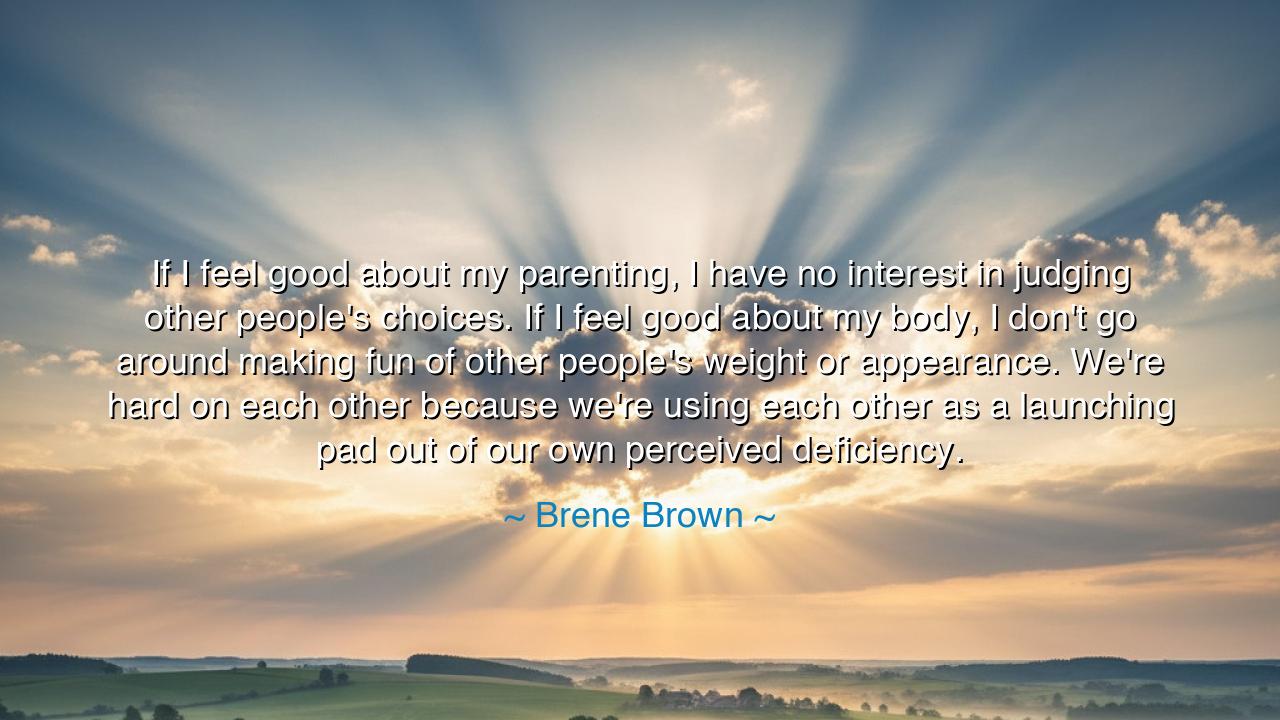
If I feel good about my parenting, I have no interest in judging
If I feel good about my parenting, I have no interest in judging other people's choices. If I feel good about my body, I don't go around making fun of other people's weight or appearance. We're hard on each other because we're using each other as a launching pad out of our own perceived deficiency.






Brené Brown, seeker of truth in the hidden places of the human heart, once spoke words that unveil both wound and remedy: “If I feel good about my parenting, I have no interest in judging other people’s choices. If I feel good about my body, I don’t go around making fun of other people’s weight or appearance. We’re hard on each other because we’re using each other as a launching pad out of our own perceived deficiency.” In these words lies the revelation that judgment is rarely born of righteousness—it springs instead from insecurity, from the ache of not feeling enough, from the restless need to build oneself up by tearing another down.
The essence of her wisdom is that comparison is poison. When we are at peace with ourselves, when we feel secure in our roles as parents, partners, or individuals, we have no need to diminish others. But when the heart burns with shame or inadequacy, it seeks relief by striking outward. Thus, the gossiping tongue, the mocking eye, the harsh judgment—all are not signs of superiority but symptoms of inner woundedness. Brown exposes this cycle so that future generations may recognize it and choose a higher path.
History bears witness to this truth. Consider the Pharisees in the time of Christ, men who judged others with severity, boasting of their own piety while condemning the weak. Yet their harshness revealed not holiness, but fear—the fear that their identity and worth could crumble without comparison. In contrast, Christ Himself, secure in His mission and love, judged no one by outward measure but lifted each soul with compassion. This contrast teaches us that those who are whole lift others up, while those who are fractured seek to push others down.
Brown also speaks with special tenderness about parenting and body image, two realms where judgment runs rampant in the modern world. Parents often measure themselves against other families, mocking what is different to cover their own doubts. Women and men alike criticize bodies that do not match cultural ideals, forgetting that such criticism springs from their own dissatisfaction. Her words remind us that true confidence silences comparison. The parent who knows they are loving well has no need to condemn another’s methods; the person who honors their own body has no need to shame another’s form.
This wisdom calls for courage, for it demands that we confront our own deficiencies rather than hide them in judgment. It is easier to laugh at another’s scars than to tend to our own. Yet healing begins when we recognize that our harshness is not truth but projection. To break the cycle, we must first cultivate self-acceptance—through gratitude, through honest reflection, through surrounding ourselves with voices of encouragement rather than condemnation.
The lesson for all generations is this: if you find yourself ready to judge, pause and ask, “What in me feels lacking?” For the measure of maturity is not in how sharp your criticisms are, but in how gently you treat both yourself and others. When you nurture your own soul, you gain the strength to see others not as threats or rivals, but as fellow travelers in need of compassion.
Therefore, let Brené Brown’s words endure as a torch in the darkness: cease to use others as a launching pad, for it lifts you no higher and leaves them broken. Instead, rise by strengthening your own foundation—your own parenting, your own body, your own sense of worth. Then, secure in yourself, you may honor the journeys of others without fear or envy.
And so the teaching stands: the one who is whole does not harm, the one who is confident does not mock, and the one who is at peace does not judge. Seek wholeness within, and you will become a source of peace for all around you. Would you like me to make this teaching more fiery and motivational, like a rallying call to cast off judgment, or keep it in this gentle, ancient-sage cadence of reflection and counsel?






AAdministratorAdministrator
Welcome, honored guests. Please leave a comment, we will respond soon